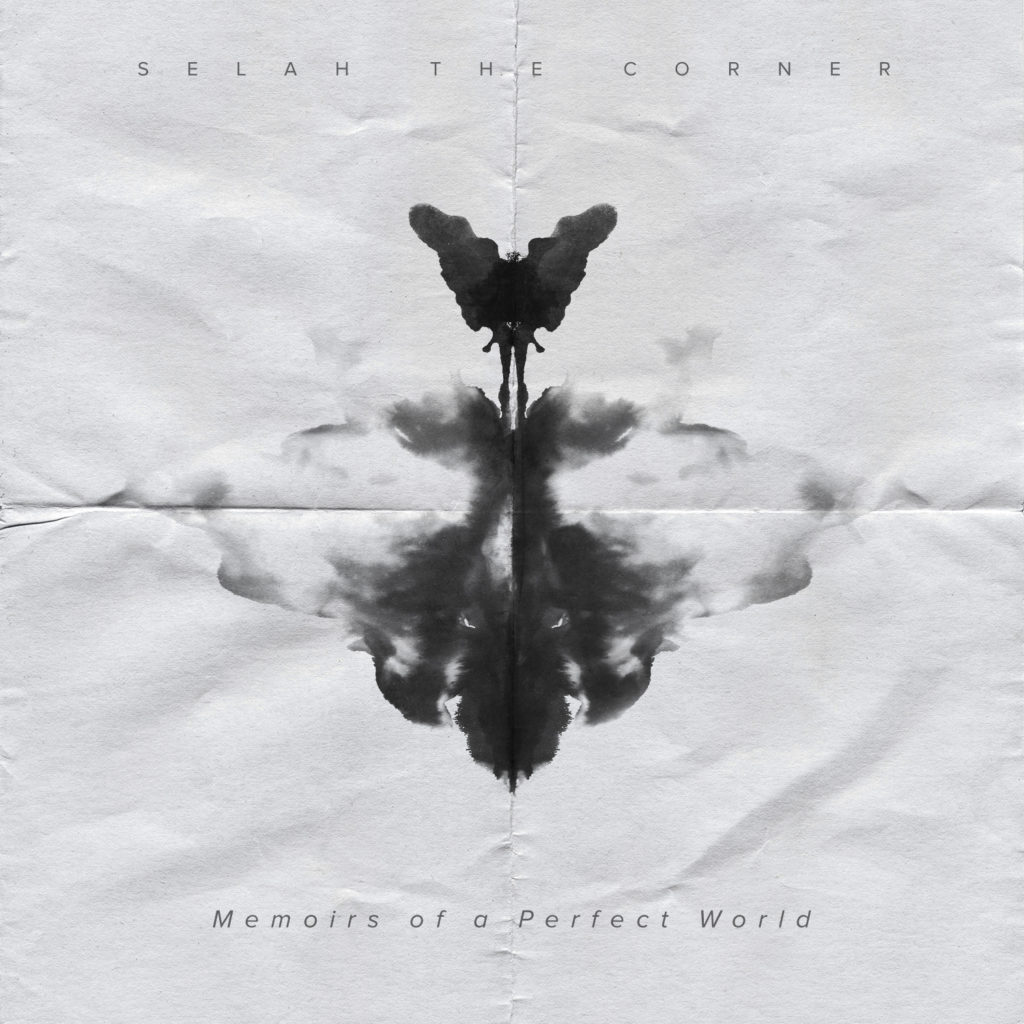“[I’m] a man of God, I’m a rapper, and I’m flawed.”
Selah is a word found in the bible many times, especially in the book of Psalms and “it means stop and think and that’s what I want my listeners to do.” The second part of his name, The Corner simply refers to what happens when you come to a street corner.
“You follow the block and then the corner changes your direction. It doesn’t force you to turn. The street doesn’t grab you by your shoulders and physically turn you, but it doesn’t leave you a choice either. If you’re going to keep following this street, you’re going to have to change directions.”
As an artist, he wants to embody the street corner that doesn’t force you to change directions, but does not give you any room for alternatives. He wants his listeners to hear his music, and go towards God when they face the corner.
Selah The Corner’s new album is called Memoirs of a Perfect World, and “it’s basically expressing to the listener all the delusions that I have about life that God corrected. Memoirs are memories, and there’s no such thing as a perfect world, so my memories of a perfect world aren’t reality.”

The album cover may seem like it shows many things to a listener’s eyes, but it is simply an ink blot on a piece of paper. “What you see is based on what you perceive it to be.” Some may see an angel, a butterfly or moth, a beast with a face, but it is not a set image. This correlated with the album’s focus on seeing life through perspectives.
“When the smoke clears, what you see is what you see, and I want people to ask themselves, ‘Why do I see a moth? Why do I see an angel? Why do I see this?’ That’s what I do in the album.”
God Over Money Records’ artist Selah The Corner has released mixtapes in the past, but Memoirs of a Perfect World is his first album. “It took me getting my footing and understanding what my objectives were and realizing how much work it was going to take to accomplish the goals that I wanted to accomplish, and that was a lot of work.” He said that despite the challenges, creating this album has been a rewarding experience, even before the public had the opportunity to hear it.
“Memoirs” is the title track of the album, and features Selah’s father. “I thought that was important for me to do, to make my family a part of my album creation process. I had my family speaking about what it was like finding out they were having me.” He said that it was a surreal experience to have his father on this song, and wants to use this track to introduce the listener to his family.
“I wanted people to understand how close knit my family is. It’s something you wouldn’t know about me if I didn’t tell you.”
The second song is called “Masquerade” in which Selah The Corner talks about his concern that Christian hip-hop artists are doing whatever it takes to maximize their profits. “I’m from the street and there’s certain characteristics that I’ve let go of completely for the gospel, but there are certain characteristics that I’ve maintained, and one of those characteristics is loyalty.” He says that Christians should be loyal to God through all circumstances in life, because God deserves and wants that from us.
“You don’t have to understand why you should trust God. He gives us the opportunity to understand through His grace and through waking us up every morning.”
Selah the Corner says he blindly trusts God, knowing that God needs to always be trusted, whether or not he can see the fruits and effects of that loyalty. “Money is a necessity and it’s a tool, so it’s definitely necessary, but I don’t believe that you should forsake your foundations to get it and I feel like a lot of CHH artists are doing that. I’m going to follow this trend and that trend. I don’t see authenticity as I used to, as much.” In a masquerade ball, people wear masks to hide their identity. Selah says that he will not wear a mask and refuses to do what is wrong in order to please others or increase profit.
“Sticc and Moov” is “one of the songs I’ve been waiting on my whole life.” Selah The Corner loves the music of Eshon Burgundy, and this gave him the opportunity to make a song with the Philadelphia native for the first time. It is a song about brotherhood and camaraderie. “In the urban communities we have this term called ‘shooting the one,’ and that means a one-on-one fight.”
He says that in the gospel and among Christians, nobody is fighting alone.
“If my brother is fighting, I’m fighting with him. If he needs prayer, I’m praying with him. If he’s struggling with something, I’m right there with him.”
“SCL2” is is a sequel to a song, “Summa Cum Laude” from Selah’s 2013 Hoodie Season mixtape. Summa Cum Laude is a Latin phrase meaning “with the highest distinction” and is used to recognize the graduates with the top GPA in their graduating class. With this song, he wanted to show that Christian hip-hop has some of the best lyricists of hip-hop.
“The lyricists that operate in Christian hip-hop are some of the greatest on the planet. A lot of it is overlooked because we rap for Christ, but if you really are a rap scientist, you can recognize how much skill it takes to make record after record with no profanity in a world that craves profanity.”
The song features Dre Murray “who absolutely obliterated that record” and Kayla Starks.
For Memoirs of a Perfect World, Selah The Corner wrote a song about his own personality, called “Intro Vert.” “I don’t like crowds. I get anxious when too many people are in the room. That’s how I’ve always been.” He says that this is an intimate song where he allows the listener into his life. Due to this part of his personality, performing at events is challenging, but he is willing to do it because of his mission of ministering to listeners.
“The way it [the title] is set up, it’s telling you I’m an introvert but it’s still introducing you up [to God], because vert means up.”
“Uriah States of America” is a song inspired by the biblical story of Uriah and David, found in 2 Samuel. David was the king of Israel, and he wanted a woman named Bathsheba, but she was married to a soldier named Uriah. “While Uriah is fighting, David sleeps with Bathsheba and she ends up getting pregnant. Uriah comes home, he doesn’t know his wife is pregnant. David, in attempt to get him out of the way, has him moved to the front of the fighting where the fighting is fiercest so that he could be killed,” paraphrased Selah.
“If you make America Bathsheba, the woman, and the natives who were here first be Uriah, the people who came to colonize America very much had the King David characteristics.” Many rappers talk about race in songs, but very few speak about how America has and does oppress Native Americans. According to the 2010 National Census, only 1.7% of the U.S. population identified as American Indian or Alaska Native.
“I don’t really hear Christian rappers crying out on behalf of other people. Usually it’s the black artist who cries out on behalf of black people… As Christians we don’t really pay attention to how much treachery and horror they had to endure… The Natives were slaughtered and we are living and breathing and enjoying the fruits of their slaughter, right now, to this day.”
The second to last song, “Fairy Tale,” tells a story of two scenarios which Selah The Corner has witnessed over and over again. “In the urban communities, everyone wants to accomplish their dreams and everyone wants to be successful and everybody wants to do what they want to do and be who they want to be, but it’s not always available to them.”
One story features a young woman who aspires to be a model, but her efforts are not successful, so she gets desperate and becomes mixed up with some bad people in pursuit of that dream. “All of her dreams fall apart.” The other story tells of a “bad guy gone good,” now a motivated man wanting to take care of his family, but cannot leave the street alone.
“All of those things are going on, but there are people in that place or those places all over the country in the project and the slums who have really big dreams for themselves, and they want that dream to come true more than anything else.”
He feels a responsibility to bring these stories of the struggles of people in urban communities to people outside of such communities, and wants to do that through this song.
The final song on Memoirs of a Perfect World is called “Amnesia” and contrasts from the first song, “Memoirs.”
“The whole album is talking about my misconceptions and delusions about life, but by the end of the project, because every track holds hands with each other and leads into each other, at the end of the process all the delusions that I had about life, I no longer have any more.”
Selah says that “Amnesia” is the victory because he has lost from his memory the lies and falsehoods that he has believed throughout his life.
You can follow Selah The Corner on Facebook, Twitter, and Instagram.
You can get Memoirs of a Perfect World on iTunes, Amazon, and Google Play.


![Legin – Cardinals feat. Mike Bell [fka John Doe]](https://www.jamthehype.com/wp-content/uploads/2015/02/Legin-–-Cardinals-feat.-Mike-Bell-fka-John-Doe.jpg)


